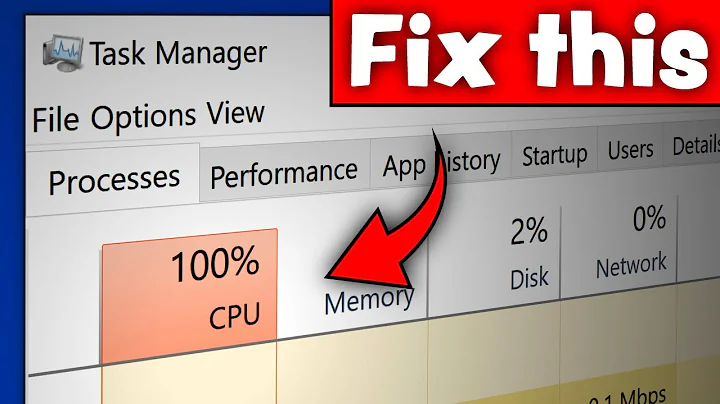Can I run my CPU at 100% usage for a long time?
Solution 1
tl;dr– Issues like overheating and excessive wearing can be important considerations for computers that handle heavier loads.
A lot of folks do run their computers continuously at ~100%. This is common practice in computational work, e.g. with engineering simulations or data analysis.
There're two common things to watch out for:
Overheating:
Is your CPU, GPU, motherboard, RAM, disk, etc., getting too hot?Excessive wearing:
Is a piece of hardware that can get worn out being used too much? For example, some consumer disk drives aren't made to be constantly reading/writing data.
1: Overheating issues.
CPU overheating:
In most cases, most heat will come from your CPU – which'll likely be the concern if you're observing 100% CPU usage (which is different from 100% GPU usage, 100% disk usage, 100% network usage, etc.). So, monitoring the CPU temperature is usually the initial focus.Motherboard overheating:
A related issue is the motherboard's temperature. A lot of folks ignore it and assume that it's probably fine as long as the other hardware temperatures are in-control, which seems to be a reasonable guestimate in most cases so long as there's also good air circulation inside of the box. This can be more dubious in the case of compact devices, e.g. laptops.GPU overheating:
GPU temperatures can be a big issue for folks who make heavy use of the GPU, including gamers, graphics professionals, and those who use GPU's as computational co-processors. I think I've seen even little Flash games in a browser go hard on a GPU, presumably due to inefficiency.RAM (memory) overheating:
RAM (memory) temperatures can be an issue especially with highly overclocked RAM. Some vendors'll sell fans with their high-frequency RAM for this reason.Disk overheating:
Some disk drives, e.g. 15,000-RPM hard disks, can have trouble with overheating. I haven't heard of overheating being a big problem with most lower-speed hard-disk drives (HDD's) and solid-state drives (SSD's).
There're other heats that one might watch out for, e.g. a heavily used server might watch out for heating on its network card while a computer with an embedded radio device might watch out there, but those seem to be less common sources of concern for typical users.
2. Excessive wearing issues.
Disk wearing:
Most(I think?) disk drives aren't made to be continuously used at max capacity. So if you have an app that's constantly maxing out a disk drive, e.g. if it's constantly rewriting log files, then that might be something to check into. Servers and professional workstations often have disk drives designed to handle heavier loads.Fan wearing:
Cooling fans continuously running at max might get worn out. A complicating issue with fans can be that if one wears out, but you don't notice it or monitor the related temperatures, then something might get excessively hot before the fan's failure is noticed.
Power-supply unit (PSU) wearing can also be an issue.
Discussion
If your CPU is running at 100% in short bursts, I wouldn't typically be too concerned by that in most cases.
If it's a common thing for your computer, especially over long time periods, you may want to understand the associated heat and wear issues. Professional users, gamers, and other power users often design their own computers specific to their anticipated usage.
Solution 2
In theory, so long as a computer can keep itself within tolerance as to temperatures, then it should be able to do that 'forever'.
In practice, laptops tend to struggle with the keeping cool part and even some desktops have poor airflow characteristics which will result in long-term heat build-up.
If your machine can stay within tolerance, then all you are really doing is shortening the life of the fans.
Solution 3
There's nothing to worry about, but download Intel Extreme Tuning Utility and see if you're getting throttled.
It shouldn't normally be a problem on that specific laptop, but there are power limits as well as hard thermal limits. On my laptop, for example, I can run 100% CPU all day long at 2.0 GHz. But, if I let it spike up to 2.2 GHz or higher, within a couple minutes I start getting throttled due to power limiting, and then my laptop drops itself down to 400 MHz. From what I've read, this is common across several manufacturers on the 14" class laptops.
The point being... it's counter-intuitive but sometimes you can get that workload done faster by lowering your limits. Use XTU to find out for your specific use case.
Solution 4
Not entirely without worries. Though I guess you can probably do it, if you don't plan to do it for months.
There are different aspects to consider, the most important one for this particular notebook being that its cooling is rather insufficient for that purpose, so it will get hot (generally an issue with notebooks, they're not designed for that purpose).
If you google for e.g. "stress test", you will find that under high load the CPU reaches around 90-92°C (which is acceptable) and throttles down to 1.5GHz. The notebook itself reaches peak temperatures on the outside of 50-55°C. Which is, well, not that awesome.
If it has that temperature on the outside, then that necessarily means it has that temperature (and presumably another 3-5°C more) on the inside, too.
For some components (the CPU, notably) that's a total non-issue, but for other components, it's not so awesome if a long life is desired. So... yes, this may be a problem.
Other issues with very high loads over long time that one might in general have to consider is the cooler fan's lifetime (running at max speed all the time), and generally the CPU overheating (used to be an issue especially with cheapish cooling, but modern CPUs make this problem almost non-existent by throttling down accordingly).
Another issue for very high loads on laptops in general is the (usually cheap) power supply unit running somewhat on the upper end and croaking after short time. That shouldn't be an issue with this particular notebook since its PSU is designed to accomodate not just the CPU but also the GTX-1050Ti (which is idle during Matlab use), and if the specs are truthful should be at around 40% load only.
Also, even when operating within thermal limits, there is degradation which is proportional with use, although whether your CPU lives 35 years or 17 years probably makes no practical difference (since a capacitator on your motherboard will die long before that time anyway, or something else).
Solution 5
If I planned to do intensive CPU-bound processing on any computer, I would use a "server-style" computer to do it instead of a laptop. In my opinion, laptops really are not designed to "run hot." I think that you need to use a computer with a larger case that is truly designed, from the ground up, to be "a server." One that is designed to be able to siphon-away all of the heat that might be generated by the electronics when everything is running full-bore for hours or days on end.
Related videos on Youtube
aadil095
Updated on September 18, 2022Comments
-
 aadil095 over 1 year
aadil095 over 1 yearI have a Dell XPS 15 9570, 32 GB ram, 2.2 ghz and 6 cores. When i use an application (The parsim command on MATLAB) (for more details) then my fan starts running fast , during this my PC doesn't seem to be heating but it never got this noisy in the past so it got me worried. In my task manager , the CPU usage shows 100% when this application is running.
- Is it a problem for the life of laptop, if I run the PC at CPU 100% for like 4 hours in a day?
- Do I need to be worried about the noisy fan during the application?
-
 DavidPostill about 4 yearsComments are not for extended discussion; this conversation has been moved to chat.
DavidPostill about 4 yearsComments are not for extended discussion; this conversation has been moved to chat. -
hk_ about 4 yearsI have the same problem with my 2011 macbook pro 13 - Can't do heavy work, fans will starts...I think it is OK but with fan on and over heating, performance gets affected as well.
-
 Strawberry about 4 yearsYes, it's a problem. This machine will overheat, and shut down. Mine does. Regularly. But I can't say whether ot not this shortens the life of the laptop.
Strawberry about 4 yearsYes, it's a problem. This machine will overheat, and shut down. Mine does. Regularly. But I can't say whether ot not this shortens the life of the laptop. -
 Gravity about 4 yearsPeople make such a fuss over such a simple problem: it is not the CPU utilization (%) that could kill the CPU, it is the temperature. If your fan/heat radiator can keep the CPU temperature way under the critical threshold, then you have no reason to worry. It is that simple! Just find out your CPU critical temperature and current CPU temperature. Compare them and decide if they are too close.
Gravity about 4 yearsPeople make such a fuss over such a simple problem: it is not the CPU utilization (%) that could kill the CPU, it is the temperature. If your fan/heat radiator can keep the CPU temperature way under the critical threshold, then you have no reason to worry. It is that simple! Just find out your CPU critical temperature and current CPU temperature. Compare them and decide if they are too close.
-
 LPChip about 4 yearsThe Dell XPS 15 is known to be doing well under heavy loads, but will get loud, so yeah, this is pretty normal. My sources, Linus Tech Tips and Dave 2D.
LPChip about 4 yearsThe Dell XPS 15 is known to be doing well under heavy loads, but will get loud, so yeah, this is pretty normal. My sources, Linus Tech Tips and Dave 2D. -
 J... about 4 yearsEven good laptops at 100% will hit maximum temperature - we run Precision laptops at heavy CPU loads and have plenty that have done this day in and out for years. The chips all hit Tj(max) and effectively run at 100C most of the day, most days of the week. I've never seen a system fail because of it - at least not CPU/RAM. The chip will throttle to maintain 100C but, as far as I've seen, the chips are totally fine to run like that.
J... about 4 yearsEven good laptops at 100% will hit maximum temperature - we run Precision laptops at heavy CPU loads and have plenty that have done this day in and out for years. The chips all hit Tj(max) and effectively run at 100C most of the day, most days of the week. I've never seen a system fail because of it - at least not CPU/RAM. The chip will throttle to maintain 100C but, as far as I've seen, the chips are totally fine to run like that. -
Abdul Wahab about 4 yearsAnother suggestion: sometimes cleaning the filters/air intake really helps. If the airflow is obstructed, fan will try to compensate by rotating faster.
-
Voo about 4 yearsEven when you keep eletronic parts within tolerances, you will still shorten the lifetime of most of them. For just one example you can check out Google's hard drive study to see how temperature effects lifetime in practice. Or see this for some nice graphs and formulas. Longeviety definitely suffers due to heat. It's definitely a long-term thing though.
-
xorsyst about 4 yearsBe aware that 3rd-party "laptop coolers" are available cheaply that can help mitigate temperature buildup and therefore noise.
-
user253751 about 4 yearsAlso note: if your computer can't keep itself cool at full speed, it will either slow down, or turn off - it shouldn't melt, or anything like that.
-
 Mast about 4 years@user253751 Yes, thanks to the Catastrophic Shutdown Detector. At least, that's what Intel calls it.
Mast about 4 years@user253751 Yes, thanks to the Catastrophic Shutdown Detector. At least, that's what Intel calls it. -
 J... about 4 years@Voo CPUs are very different from hard drives, and especially modern Intel CPUs are almost bullet proof. I've seen a lot of computers live and die, I've seen a lot of components live and die... CPUs almost never, ever die. No matter how hard they've been used.
J... about 4 years@Voo CPUs are very different from hard drives, and especially modern Intel CPUs are almost bullet proof. I've seen a lot of computers live and die, I've seen a lot of components live and die... CPUs almost never, ever die. No matter how hard they've been used. -
 J... about 4 years@user253751 That's certainly true now. There was a time 15-20 years ago when you could easily toast an AMD processor by simply lifting the heatsink. Magic smoke + dead chip within seconds. These days it's very difficult to accidentally roast a CPU, though, that much is true.
J... about 4 years@user253751 That's certainly true now. There was a time 15-20 years ago when you could easily toast an AMD processor by simply lifting the heatsink. Magic smoke + dead chip within seconds. These days it's very difficult to accidentally roast a CPU, though, that much is true. -
Voo about 4 years@J True, CPUs are rather resilient these days. But if CPUs and GPUs produce a lot of heat that also increases the environment temperature inside the case. This is particularly true for laptops. It's not as if the hard drives in Google's data centers are responsible for their temperature.
-
Ismael Miguel about 4 yearsHDDs and NVMe SSDs are particularly picky about temperatures. SATA SSDs seem to be more forgiving about temperatures.
-
 Peter Cordes about 4 years@user253751: nearly no laptops can keep themselves at max turbo, if they support turbo boost. The whole point of turbo is to take advantage of thermal inertia and run bursty workloads faster than the steady-state CPU frequency your lightweight cooling can sustain. Why can't my CPU maintain peak performance in HPC shows an extreme case (Lenovo Yoga-3 with a Core M-5Y71 CPU; very low TDP that can still turbo high.)
Peter Cordes about 4 years@user253751: nearly no laptops can keep themselves at max turbo, if they support turbo boost. The whole point of turbo is to take advantage of thermal inertia and run bursty workloads faster than the steady-state CPU frequency your lightweight cooling can sustain. Why can't my CPU maintain peak performance in HPC shows an extreme case (Lenovo Yoga-3 with a Core M-5Y71 CPU; very low TDP that can still turbo high.) -
Clumsy cat about 4 yearsCan confirm from personal experience that SSDs are vulnerable to reaching a write limit if they are used as swap for extended periods.... unix.stackexchange.com/questions/560611/…
-
xiaomy about 4 years@LPChip Maybe XPS's today are better but not my experience in the past. Source: Had 3 XPS 15's over ~7 years.
-
 LPChip about 4 years@xiaomy and you are 100% sure it was the CPU that died on each occasion, because you overclocked it and used it extensively?
LPChip about 4 years@xiaomy and you are 100% sure it was the CPU that died on each occasion, because you overclocked it and used it extensively? -
 aadil095 about 4 yearsI am looking into this option thanks ! MATLAB has this thing called MATLAB parallel server , so I can use their servers instead of my PC
aadil095 about 4 yearsI am looking into this option thanks ! MATLAB has this thing called MATLAB parallel server , so I can use their servers instead of my PC -
Nelson about 4 yearsDisc read/writes don't use the CPU. That's offloaded to... one of the bridges (north/south, I forgot. Probably south?)
-
 Nat about 4 years@Nelson: Yeah, disk I/O doesn't tend to use too much CPU time (with some disk-encryption schemes being an exception). The concern'd moreso be that, if a program's maxing out CPU time, then it may be performing disk writes too.
Nat about 4 years@Nelson: Yeah, disk I/O doesn't tend to use too much CPU time (with some disk-encryption schemes being an exception). The concern'd moreso be that, if a program's maxing out CPU time, then it may be performing disk writes too. -
SamYonnou about 4 yearsOne more suggestion: it may also be worthwhile to undervolt the CPU using Intel XTU if your processor supports it. My old 7700HQ used to quickly reach into 95-102 range and thermal throttle running at 100%. Now I'm running with an 0.08V undervolt and it only rarely reaches 95 max on one core and 92 max on all other cores, almost never thermal throttling. As for stability it's processor dependent, but in my case I've found 0.08V to be stable and error-free for over a month of running 100% 24/7. I've tried 0.1V undervolt previously but it had stability issues after a week or so.
-
xiaomy about 4 years@LPChip I don't really understand your question. None of my XPS's died but they all suffered from frequent throttling as a result of bad design or material used.
-
JCRM about 4 yearsdisk drives for datacentres are designed for higher utilisation
-
 LPChip about 4 years@xiaomy well yes, that is exactly my point. They are designed to throttle, so no harm is done, which is what OP is asking about.
LPChip about 4 years@xiaomy well yes, that is exactly my point. They are designed to throttle, so no harm is done, which is what OP is asking about. -
 Admin about 4 yearsI will add "Thermal paste" dry-off in bold letter. It happened to me with an old laptop. I didn't know any such thing exists, so I damaged the laptop case before realizing the actual issue.
Admin about 4 yearsI will add "Thermal paste" dry-off in bold letter. It happened to me with an old laptop. I didn't know any such thing exists, so I damaged the laptop case before realizing the actual issue. -
 computercarguy about 4 yearsAs to 1.5: IME, HD temps are likely critical to their lifespan. I've been using active (heatsink + fan) and passive (fan blowing on drive) cooling on my personal desktop drives for +15 years and haven't lost a single one, including a 80GB drive I still use as an OS drive. I don't use expensive drives with some being Maxtor ATA133 IDE drives. I have one mid-tower "server" running 5-6 of these drives. As a computer tech, I've seen most uncooled drives die in 3-5 years, usually right after their warranty ends.
computercarguy about 4 yearsAs to 1.5: IME, HD temps are likely critical to their lifespan. I've been using active (heatsink + fan) and passive (fan blowing on drive) cooling on my personal desktop drives for +15 years and haven't lost a single one, including a 80GB drive I still use as an OS drive. I don't use expensive drives with some being Maxtor ATA133 IDE drives. I have one mid-tower "server" running 5-6 of these drives. As a computer tech, I've seen most uncooled drives die in 3-5 years, usually right after their warranty ends. -
 computercarguy about 4 yearsMost components that can fail due to temps have been replaced with those that won't, such as capacitors. Now the problem is (still) heat expansion, where when the parts heat up & expand or cool & contract at different rates, causing stress fractures. Keeping an even temp, you can potentially let your computer run "forever", but doing that isn't going to be easy. If you shut if off or even let it sit without doing constant calculations, it'll change temps causing potential stress, and so will heating it back up. Smaller temp ranges are good, but hard to maintain.
computercarguy about 4 yearsMost components that can fail due to temps have been replaced with those that won't, such as capacitors. Now the problem is (still) heat expansion, where when the parts heat up & expand or cool & contract at different rates, causing stress fractures. Keeping an even temp, you can potentially let your computer run "forever", but doing that isn't going to be easy. If you shut if off or even let it sit without doing constant calculations, it'll change temps causing potential stress, and so will heating it back up. Smaller temp ranges are good, but hard to maintain. -
xiaomy about 4 years@LPChip Yes probably no harm done. But I wouldn't call a computer that throttles frequently under heavy load and thus impairs its performance greatly "doing well under heavy load". Again, don't know about the current XPS. Just talking about what I've had.
-
Voo about 4 years@computercarguy Do you mean capacitors don't suffer usable life reduction due to heat? Because that's absolutely not the case. See here for some graphs and formulas for electrolytic capacitors to name just one example. Or you can simply look at Google's data for HDDs that shows life reduction for high temperatures (with no changing temperatures).
-
 computercarguy about 4 years@Voo, I was saying that most of the electrolytic caps have been replaced with solid state caps that aren't as subject to heat problems. And HD's keep getting better, even at heat management, as with everything else. I've had active or passive cooling on my HD's for the past +15 years and haven't lost one, even the 80GB Maxtor 133 IDE I use as an OS drive for my mid-tower "server", which is 1 of around 5 sub-TB drives in that machine.
computercarguy about 4 years@Voo, I was saying that most of the electrolytic caps have been replaced with solid state caps that aren't as subject to heat problems. And HD's keep getting better, even at heat management, as with everything else. I've had active or passive cooling on my HD's for the past +15 years and haven't lost one, even the 80GB Maxtor 133 IDE I use as an OS drive for my mid-tower "server", which is 1 of around 5 sub-TB drives in that machine. -
Voo about 4 years@computer It's mostly an academic issue, particularly for the given scenario since we're talking about 4 hours of high load for a few days. But I'd be pretty confident that if you took two laptops and let one run at 100% CPU and GPU in a small enclosure 24/7 and had another one working modestly at reasonable room temps, that the first one would die much sooner on average than the other. After all even solid state caps are pretty strongly affected by high temps, it just doesn't matter too much due to their long lifetime. Also I've seen cheap MBs with electrolytic caps not too long ago.
-
 computercarguy about 4 years@Voo, it depends on how old and how abused the components are, too. A gaming rig that's used heavily might die quicker, or it might be hardened against this usage. An older business desktop might have really cheap components that won't stand up to the abuse for any length of time, especially if the electrolytic caps have dried out. Looking again at the specs for the OP, it's a bit of a tossup. Decent specs, but low star reviews, and I'm not fond of Dell because of their lack of quality. If this was a personal machine, I'd be worried about remaining life, but if it's business, blow it up. ;-)
computercarguy about 4 years@Voo, it depends on how old and how abused the components are, too. A gaming rig that's used heavily might die quicker, or it might be hardened against this usage. An older business desktop might have really cheap components that won't stand up to the abuse for any length of time, especially if the electrolytic caps have dried out. Looking again at the specs for the OP, it's a bit of a tossup. Decent specs, but low star reviews, and I'm not fond of Dell because of their lack of quality. If this was a personal machine, I'd be worried about remaining life, but if it's business, blow it up. ;-) -
 SilverbackNet about 4 yearsOlder SSDs that tried to push the speed envelope definitely had heat issues, I've seen one or two that had a scorched controller chip, but they've benefited enormously from process improvement and general design refinement. Running hot is always just a question of which component will fail first. Even batteries fail faster from excessive heat!
SilverbackNet about 4 yearsOlder SSDs that tried to push the speed envelope definitely had heat issues, I've seen one or two that had a scorched controller chip, but they've benefited enormously from process improvement and general design refinement. Running hot is always just a question of which component will fail first. Even batteries fail faster from excessive heat! -
 Sadaharu Wakisaka about 4 yearsAn extra concern; the plastic parts got hydrolysed faster by heat and sticky, you might feel them horrible.
Sadaharu Wakisaka about 4 yearsAn extra concern; the plastic parts got hydrolysed faster by heat and sticky, you might feel them horrible. -
 Nat about 4 years+1 because the observation of the CPU degrading is both technically true and conceptually interesting. That said, it probably isn't a big issue in most cases -- extreme overclocking being a possible exception.
Nat about 4 years+1 because the observation of the CPU degrading is both technically true and conceptually interesting. That said, it probably isn't a big issue in most cases -- extreme overclocking being a possible exception. -
 bazza almost 4 yearsSeconded: Also, see en.wikipedia.org/wiki/Electromigration. It used to be something that people worried about 40 years ago, mostly when upgrade cycles were slow (so the thinking was that a CPU had to last for a long time). Nowadays we chuck stuff out after a year or so. I suspect the design margins built into gates make them more susceptible these days than in the past. Still something to consider for specialised, long lifed, impossible to service, mustn't ever stop systems.
bazza almost 4 yearsSeconded: Also, see en.wikipedia.org/wiki/Electromigration. It used to be something that people worried about 40 years ago, mostly when upgrade cycles were slow (so the thinking was that a CPU had to last for a long time). Nowadays we chuck stuff out after a year or so. I suspect the design margins built into gates make them more susceptible these days than in the past. Still something to consider for specialised, long lifed, impossible to service, mustn't ever stop systems.




